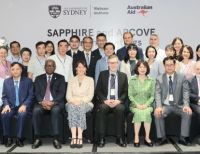The University of Sydney’s Net Zero Initiative (NZI) has today released the Path to Net Zero, a white paper which outlines technologies and market-ready solutions it is developing, to contribute to Australia’s targets for emissions reductions of 43 percent by 2030 and net zero by 2050.
Led by Professor Deanna D’Alessandro, the report’s recommendations present the latest in net zero research and technology, as well as four holistic and systemic approaches aimed at achieving net zero emissions targets, including demand reduction, zero emissions energy and industry, greenhouse gas removals, and climate risk modelling.
The paper’s release comes one year after Australian Parliament passed the Climate Change Act, legislating Australia’s targets to reduce emissions by 43 percent on 2005 levels by 2030 and net zero emissions by 2050.
“Australia is running out of easy options to reduce emissions by 43 percent by 2030,” said Professor D’Alessandro. “But the good news is technology is gaining pace. In our report we present a pipeline of solutions based on the latest in research and technology to guide Australia towards meeting its Paris obligations.
“Over the past two months we’ve seen significant momentum building with the announcement of sectoral plans being developed by the new Net Zero Agency", said Professor D'Alessandro.
“Our approach is holistic – there is no silver bullet to achieving net zero. We need a whole-of-society approach: from designing smart buildings that use less energy and extracting critical minerals from e-waste, to removing historic CO2 from the atmosphere and creating a zero emissions energy industry.”
“A responsible transition to net zero emissions requires the development of an ecosystem that includes strong multidisciplinary and cross-sector partnerships. The NZI brings to the table key solutions, innovations in research, thought leadership and training in areas of critical skills shortages for the transition.
“And all of this is possible – it’s already being tested and created by researchers here at the University of Sydney and is being implemented by industry. We have the technology and talent to assist with rapid deployment. Now, as a society, we need to give it our all.”
The white paper summarises the following technologies and approaches being developed by the Net Zero Initiative:
1. Demand reduction
- Reducing the amount of energy used by services and technology, i.e., designing more efficient buildings, using AI to reduce energy use, new generation technology and appliances that requires less energy.
- Reducing demand for fuel in transport, i.e., the electrification of cars, electric and hydrogen aircraft, the design of cities and amenities to encourage walking and cycling.
- Energy hubs – comprehensive energy systems that combine and manage various energy sources like electricity, gas, and heat to optimise energy production, storage, distribution, and use.
- Critical mineral extraction from e-waste to reduce the environmental impact of the resource and mining sectors.
2. Creating zero emissions energy and industry
- Renewable energy, such as solar and wind, and the systems in place to ensure maximum energy extraction.
- New generation energy storage systems and hydrogen storage.
- Low carbon concrete solutions, fertiliser production using low-emissions technology.
3. Greenhouse gas removals
- Enhancing carbon storage in natural ecosystems, such as planting forests, storing carbon in soil or enhancing biological carbon fixation
- Chemical and geochemical approaches, such as a direct air capture which removes CO2 from the atmosphere.
4. Mapping climate change risk
- Developing tools to undertake necessary risk assessments, such as climate change impacts on health, agriculture, and infrastructure systems.
- Understanding transition risks to business, law and society.
About the Net Zero Initiative
The Net Zero Initiative was launched by the University of Sydney’s Faculty of Engineering in 2022 to harness the University's research expertise to develop new technologies and systems to support the world's decarbonisation.
Declaration
Researchers in the Net Zero Initiative receive funding from and work with a range of industry partners to develop their technology.
















